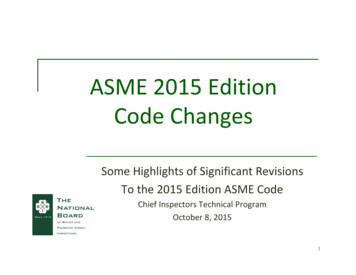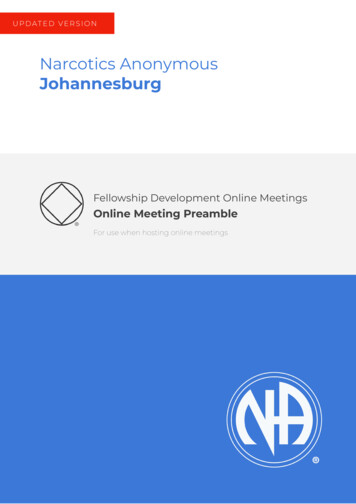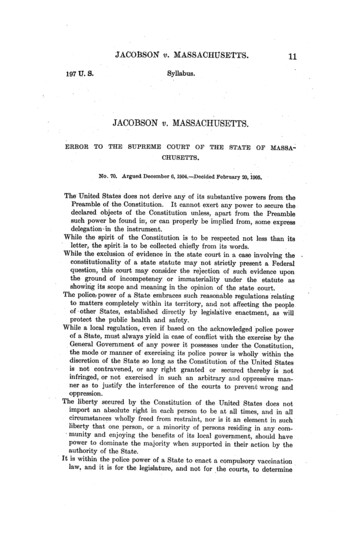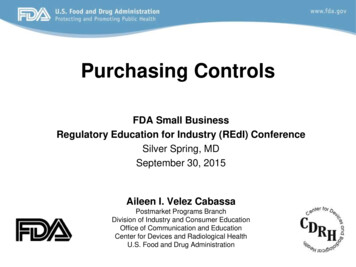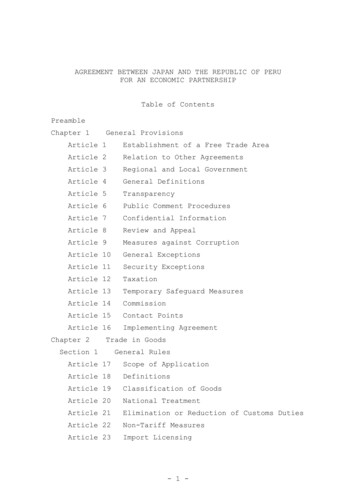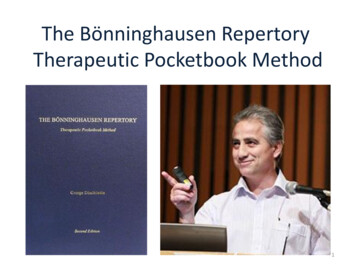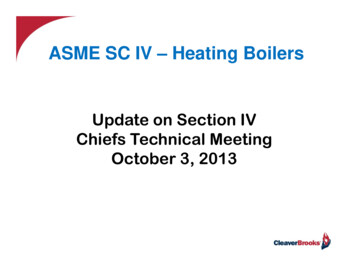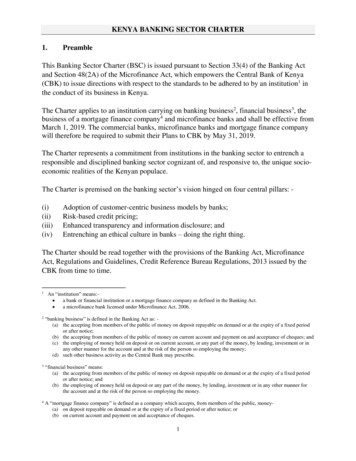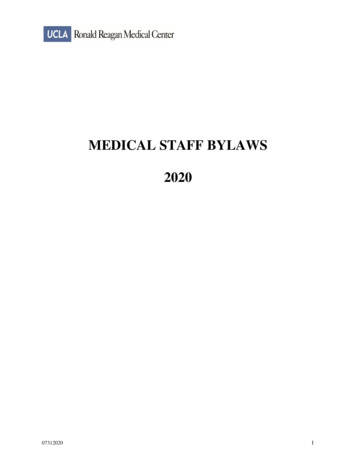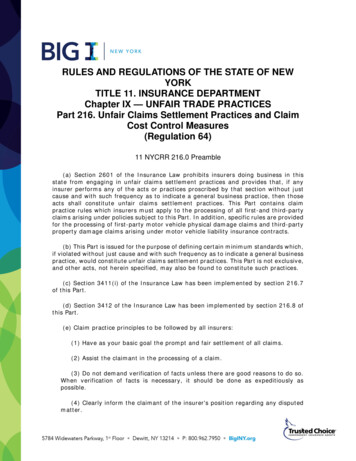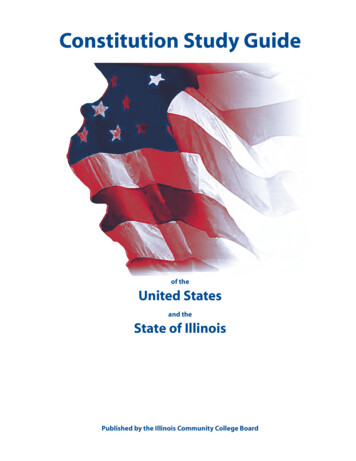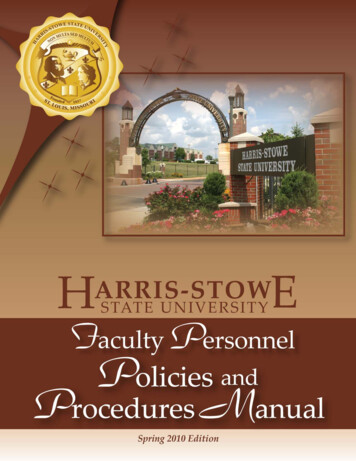
Transcription
PREAMBLEThe Faculty Personnel Policies and Procedures Manual of Harris-Stowe State University wasprepared through a collaboration of the faculty, the administration and the attorney of theUniversity.The purpose of The Faculty Personnel Policies and Procedures Manual is to serve as a writtenguide for the faculty of the University in their delivery of instruction and academic services,and for the administration in the exercise of its oversight responsibilities. These guidelineswere written while adhering to the philosophy and principles of academic freedom and thespirit of collegiality.The Faculty Personnel Policies and Procedures Manual has been developed according togeneral norms of academe, and does not provide for every possible contingency. It is notintended to abrogate or waive any rights or privileges guaranteed by federal, state ormunicipal laws.Please note the following:In the event of any conflict or inconsistency between the provisions of the Faculty Manual andthe laws of the State of Missouri and/or the laws of the United States of America, as mayhereafter be amended from time to time, the laws of the State of Missouri and/or the laws ofthe United States of America shall supersede this manual.Approved by the Board of Regents on: February 23, 2010
TABLE OF CONTENTSLETTER FROM THE UNIVERSITY PRESIDENT . 3HISTORY 4ORGANIZATION AND PHILOSOPHY . 6EQUAL OPPORTUNITY POLICY 9DISABILITY POLICY . 11SEXUAL HARASSMENT POLICY 13INVESTIGATION OF DISCRIMINATION/HARASSEMENT COMPLAINTS . .17SANCTIONS FOR VIOLATIONS OF THE DISCRIMINATION/HARASSMENT POLICY.19CAMPUS PROHIBITIONS OF DRUGS, ALCOHOL AND WEAPONS. . 20FACULTY EMPLOYMENT PRACTICES .22TENURE 30FACULTY EVALUATION SYSTEM .34UNIVERSITY STANDING COMMITTEES .37PRESENTATION OF ACADEMIC/POLICY PROPOSALS .39NORMAL TEACHING FACULTY WORK LOAD 40ADMINISTRATIVE ASSIGNMENTS AND OUTSIDE EMPLOYMENT 42GENERAL STATEMENT ON ACADEMIC FREEDOM AND RESPONSIBILITY. .43PROFESSIONAL ETHICS .45PRIMARY FACULTY RESPONSIBILITIES .47FACULTY COMPENSATION . 49UNIVERSITY SPONSORED FRINGE BENEFITS . .50STATUTORY BENEFITS 53SALARY, CHECKS AND SALARY DEDUCTIONS .54TARDINESS, UNEXCUSED ABSENCES AND INCLEMENT WEATHER . .55-1-
SICK LEAVE 56LEAVES OF ABSENCE WITH PAY . .58LEAVES OF ABSENCE WITHOUT PAY .60JOB RELATED DISABILITY (WORKERS’ COMPENSATION) .63FAMILY AND MEDICAL LEAVE .64SABBATICAL LEAVES .73FACULTY EXCHANGE PROGRAM .77FACULTY GRIEVANCE PROCEDURE .78FACULTY REDUCTION IN FORCE .80CONFLICT OF INTEREST POLICY . 81EMPLOYEE PERSONNEL RECORDS .82CREATIVE WORKS POLICY .83FAMILY EDUCATIONAL RIGHTS AND PRIVACY ACT .85MISCELLANEOUS .86-2-
HARRIS-STOWESTATE UNIVERSITYOFFICE OF THE PRESIDENTDear Faculty Member,No institution, agency, company, or school is better than the sum total of the quality of itsemployees. If employee quality is good, the institution and all that it produces will also be good.The primary factor behind employee quality is good, desirable and CONSISTENTCOMMUNICATION between those whose job it is to direct and manage the institution and itsprograms and those whose primary task it is to carry out these programs and produce the goodsor services for which the institution was created.As a member of the faculty of Harris-Stowe State University, you are a part of an importantTEAM consisting of the Board of Regents, University Administration, the Faculty and theSupport Staff all of whom share responsibility for providing high quality educational programsto our students. This manual has been developed to help you as a faculty member of theUniversity to become familiar with the policies, regulations and procedures that govern youremployment at Harris-Stowe State University. In addition, it will help you to better understandyour general duties and responsibilities and will acquaint you with the many privileges,opportunities and benefits provided by the University.It is my sincere hope that all faculty/instructional employees -- the employee group for whichthis document is intended -- will understand clearly this main purpose and regard the informationpresented in this document in a positive vein as a set of constructive guidelines which have beendesigned to clarify the conditions, expectations, benefits and opportunities available to theUniversity's instructional employees.If additional clarification or assistance is needed in the understanding of the provisions set forthin this Manual, it is my hope that the faculty will consult with the Office of Human Resources.We are very proud of all the employees of this University, just as we are very proud of theUniversity itself, and will do all within our power as administrators to see to it that eachemployee has every opportunity to do his or her best in the job or position to which he or she hasbeen assigned.Sincerely,Henry Givens, Jr.President-3-
HISTORYHarris-Stowe State University traces its origin back to 1857 when it was founded by the St.Louis Public Schools as a normal school and thus became the first public teacher educationinstitution west of the Mississippi River and the 12th such institution in the United States. Theearliest predecessor of Harris-Stowe State University was a normal school established for whitestudents only by the Public School System of the city of St. Louis. This school was later namedHarris Teachers College in honor of William Torrey Harris who had been a Superintendent ofInstruction in the St. Louis Public Schools and also a United States Commissioner of Education.The university began offering in-service education for St. Louis white teachers as early as 1906.In 1920, Harris Teachers College became a four-year undergraduate institution authorized togrant a Bachelor of Arts in Education Degree. In 1924, the college received accreditation fromthe North Central Association of Colleges and Schools. Accreditation from other agenciesfollowed, including accreditation by the American Association of Colleges for TeacherEducation and the National Council for the Accreditation of Teacher Education.A second predecessor institution was Stowe Teachers College, which began in 1890 as a normalschool for future black teachers of elementary schools in the city of St. Louis. This normalschool was also founded by the St. Louis Public School System and was an extension of SumnerHigh School. In 1924, the Sumner Normal School became a four-year institution with authorityto grant the baccalaureate degree. In 1929, its name was changed to Stowe Teachers College, inhonor of the abolitionist and novelist Harriet Beecher Stowe. These two teacher educationinstitutions were merged by the Board of Education of the St. Louis Public Schools in 1954 asthe first of several steps to integrate the public schools of St. Louis. The merged institutionretained the name Harris Teachers College.Later, in response to the many requests from alumni of Stowe Teachers College and members ofthe Greater St. Louis community, the Board of Education agreed to restore to the college's namethe word "Stowe" and to drop the word "teachers." In 1979, the General Assembly of the State ofMissouri enacted Senate Bill 703 under which Harris-Stowe College became the newest memberof the State system of public higher education. The institution's name was again changed by theaddition of the word "State" and became officially known as Harris-Stowe State College. Inaddition to the name change, the university's baccalaureate degree was changed to Bachelor ofScience in Education. In compliance with the new state standards and teacher certificationrequirements, the university's teacher education curriculum was modified and three separateteacher education majors were approved: early childhood education, elementary schooleducation and middle school/high school education.In 1981, the university received state approval for a new degree program — the Bachelor ofScience in Urban Education. This program is the only one of its kind at the undergraduate levelin the United States and is designed to prepare non-teaching urban education specialists who willbe effective in solving the many urban-related problems facing today's urban schools. In 1993,the State Governor signed into law Senate Bill 153, which authorized the university to expand itsmission in order to address unmet needs of metropolitan St. Louis in various applied professionaldisciplines. In response to that authority, Harris-Stowe developed two new baccalaureate degreeprograms:1. Business Administration, with professional options in Accounting, ManagementInformation Systems, General Business and Marketing.-4-
2. Secondary Teacher Education, with subject-matter options in Biology, English,Mathematics and Social Studies.Finally, on August 25, 2005, by mandate of the State of Missouri, Harris-Stowe State Collegeobtained university status. Today the university hosts collaborative graduate degree programswith Maryville University, the University of Missouri-St. Louis and Webster University.The university continues to expand, adding new campuses and buildings as part of its 21stcentury initiative to offer opportunities for both undergraduate and graduate students seeking avariety of degrees.Thus, from its beginnings as two normal schools in the mid and late 19th century to its presentstatus as a state institution of public higher education, Harris-Stowe State University and itspredecessor institutions have always been in the forefront of teacher education. Now, with itsmission expanded to include other professional disciplines, the university will provide greatlyneeded additional opportunities to metropolitan St. Louisians in other important fields ofendeavor. The university will continue its quest for excellence in all of its offerings and striveeven more to meet the complex and demanding challenge of preparing students for effectiveroles in this region's various professions.-5-
ORGANIZATION AND PHILOSOPHYLegal Status and DefinitionsHarris-Stowe State University is a nonprofit state university governed by the laws of the state ofMissouri and the United States federal government.The phrase “Harris-Stowe State University” shall refer to the institution, in all of its persons,property and relationships wherever situated, owned, operated, controlled, managed or otherwiseregulated under the supervision or direction of the Board of Regents of Harris-Stowe StateUniversity.The phrase “Regents of Harris-Stowe State University” shall refer to the Governing Board ofHarris-Stowe State University as established by the Revised Statutes of Missouri.Accreditations and AffiliationsHarris-Stowe State University is accredited by the Higher Learning Commission, which is themajor accreditation agency for this region. The Teacher Education Program is fully accredited bythe National Council for Accreditation of Teacher Education (NCATE) and the MissouriDepartment of Elementary and Secondary Education (DESE). The University is also a memberof the American Association of Colleges for Teacher Education. The Business AdministrationProgram is accredited by the International Assembly of Collegiate Business Education (IACBE)and the Association of Collegiate Business Schools (ACBSP).Major affiliations of the University include membership in the Association for ContinuingHigher Education, Association of American Colleges and Universities, Association of GoverningBoards of Universities and Colleges, National Association of Intercollegiate Athletics, NationalAssociation for Equal Opportunity in Education (NAFEO), American National Association ofCollegiate Registrars and Admissions Officers, and the National Association of StudentPersonnel Administrators.GovernanceThe Board of Regents defines governance as essentially those processes and related activitiesthat have primarily to do with (1) policymaking and (2) the monitoring of the major operation ofthe institution in its endeavors to accomplish its state-mandated mission and purpose.The governing board of the University seeks input from all possible sources in its policy-makingendeavors and significantly involves the top administrative officers of the institution in itsmonitoring activities.The involvement of representatives from all institutional constituencies in the decision-makingprocess in relationship to the faculty means that input is sought through an establishedgovernance process and is given every consideration as administrative decisions are made.Faculty members have the opportunity, individually or as a group, to propose new policies,programs and courses through the Presentation of Academic/Policy Proposals procedure outlinedin this manual.-6-
Institutional PhilosophyHarris-Stowe State University operates, as did all of its predecessor institutions before it, withthe assumption that all people can and should have the opportunity to acquire a qualityeducation. The University is therefore deeply committed to providing the most affordable,accessible and diverse educational experience in the region. Harris-Stowe holds fast to its beliefthat each individual has the potential to achieve high degrees of excellence and deserves theopportunity to bring this potential to fruition so that he/she can reasonably serve others, achievepersonal and professional goals and remain loyal to his/her convictions and principles.Harris-Stowe State University is firmly convinced that choice is basic to self-actualization. Eachstudent is, therefore, encouraged to define his/her own goals, to acquire the knowledge and skillswhich will make possible the conditions of life which the student believes are important and todevelop a strong system of morals and values. The University believes that the proper role of aninstitution of higher learning is primarily that of providing many varied opportunities for indepth learning. Through such experiences, the individual can develop a keen sense of his/herown responsibility for acquiring skill in both marshalling and utilizing resources and inprocessing information, leading to rational and constructive problem-solving – all towards theimprovement of the quality of life for self and for others.Mission StatementHarris-Stowe State University's primary mission, as set forth in Senate Bill 153, is to address thehigher education needs of the metropolitan St. Louis region. Toward the fulfillment of thismandate, the University offers the following academic opportunities: (1) a solid GeneralEducation curriculum which serves as the foundation for the University's various baccalaureatedegree programs in the three broad professional areas, (2) baccalaureate degree programs in (a)Business Administration, (b) Teacher Education and (c) Urban Specializations.In addition, the University is thoroughly committed to meeting to the greatest extent possible theneeds of a student population that is diverse in age, culture, ethnicity and experientialbackgrounds. In short, Harris-Stowe State University is strongly committed to providing a highquality higher education experience that is both affordable and accessible to the diversepopulations within and beyond the metropolitan St. Louis region. The University seeks toaccomplish this overarching goal through an extensive academic support program, a collegepreparatory academy for urban youth, supervision of student progress and through manycommunity outreach and collaborative partnerships with businesses, government and educationalinstitutions.Underlying this commitment to a high-quality education is the University's emphasis onprofessional growth and personal development that is essential for an educated person entering aprofessional field.In pursuit of its mission, Harris-Stowe State University offers a variety of programs and servicesthat include, but are not limited to:1. Recruiting a diverse population of interested and qualified students, faculty and staff.-7-
2. Supporting student development through academic support services, extracurricularactivities, student government, cultural and community involvement, professionalorganizations and honor societies.3. Enhancing the quality and effectiveness of the student's learning environment through avariety of innovative and creative instructional techniques and delivery systems involvingmodern technology and through day, evening and Saturday courses, which accommodatethe students' varying educational and scheduling needs.4. Offering a broad and solid general education curriculum that serves as the foundation forprofessional studies and lifelong learning while accommodating transfer students.5. Offering educational experiences that emphasize excellence in all areas and promote thedevelopment of effective communication skills, interpersonal growth, critical thinking,workplace readiness and an understanding of and appreciation for diversity.6. Participating in educational and collaborative partnerships and outreach programs withbusiness, government and other educational institutions, including K-12 and highereducation.7. Providing a diverse range of cultural and educational services to the urban community,including in-service educational opportunities for professional growth and developmentof teachers, educators and other professionals.Conducting ongoing institutional assessment and modifying institutional operations, accordingly.University PresidentThe President is the chief executive officer of the University and is responsible for the generalsupervision of the University and all University personnel. The President is responsible to theBoard for the execution of the policies, rules and regulations and directives given by the Board.In both internal and external affairs, the President shall be the primary representative andspokesperson for the University to the public. In the internal operation of the University, thePresident is expected to exercise leadership and direction in the management of the Universitywhile maintaining effective working relationships with faculty, students, staff, administrators andthe internal governance units.The President is the principal administrative officer of the University and has general supervisionof all operations and programs. The Board delegates to the President the authority to recommendall faculty employees. The President shall carry out all rules, regulations, orders, directives andpolicies established by the Board and shall perform all other duties necessary or appropriate tothe administration of the University. The Board hereby delegates to the President/designee theauthority to make hiring decisions subject to Board review, action and approval. The essence ofthe relationship between the Board and the President shall be one of full and mutual confidence,completely open communication and close consultation. If the President fails or refuses toimplement or enforce a policy, rule or regulation which has been adopted by the Board, thePresident will promptly inform the Board in writing of the reasons for such failure or refusal.-8-
EQUAL OPPORTUNITY POLICYCommitmentThe University is committed to providing equal opportunity in all areas of recruiting, hiring,retention, promotion and contracted service. The University further commits itself to the policythat there shall be no unlawful discrimination against any person
disciplines. In response to that authority, Harris-Stowe developed two new baccalaureate degree programs: 1. Business Administration, with professional options in Accounting, Manage
